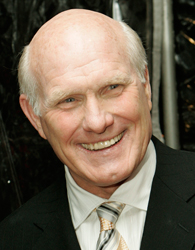Terry Bradshaw has made a career out of exceeding expectations. Though derided by fans as a country bumpkin, he deftly guided the Steelers to four Super Bowl championships in a six-year span. His post-football career has included a spot on the Billboard charts, multiple Emmys, and a star on the Hollywood Walk of Fame.
Terry Bradshaw’s Early Days
Terry Bradshaw was born on September 2, 1948, the middle child in a family of three sons born to Bill and Novis Bradshaw in Shreveport, Louisiana. He started playing football at the age of 9, and he excelled at nearly any sport he tried. During his senior year at Woodlawn High School in Shreveport, he set a national record for throwing the javelin 245 feet.
After high school, Bradshaw headed off for Louisiana Technical University in Ruston, where he honed his skills as a quarterback. By graduation, he was featured on the cover of Sports Illustrated and chosen first overall in the 1970 NFL Draft by the Pittsburgh Steelers.
Sources in this Story
- ESPN: Bashful Bradshaw?
- Sports Illustrated: Terry Bradshaw, Football, Louisiana Tech Bulldogs—02.09.70
- Sports Illustrated: Li’l Abner Finally Makes It Big
- Pittsburgh Post-Gazette: Can Terry Bradshaw spell ‘cat’? The history of an insult
- Sports Illustrated: What A Passing Parade!
- The Biography Channel: Terry Bradshaw Biography
- Pro Football Hall of Fame: Terry Bradshaw
- USA Today: Terry Bradshaw’s winning drive against depression
- FLW Outdoors Magazine: Casting Call: Terry Bradshaw
- We Are Central PA: Steeler announce first hall of honor class
Bradshaw’s NFL Career
Bradshaw’s career with the Steelers got off to a rough start on and off the field. Teammates and opponents made fun of his Louisiana accent and his intelligence, calling him the “Bayou Bumpkin,” while Steelers fans booed him constantly. “Booing Terry Bradshaw became a favorite sport in Pittsburgh,” he recalls. “Hey, what do you guys want to do tonight? Let’s go boo Terry Bradshaw.”
Bradshaw had a breakout season in 1972, leading the Steelers to the playoffs for the first time in 25 years. In his first playoff game, he completed one of the most famous passes in NFL history, the “Immaculate Reception,” a fluke 60-yard, game-winning touchdown in the game’s dying seconds.
After an injury-riddled 1973 season, Bradshaw’s life began to fall apart. In 1974, he divorced his wife of 18 months, lost his starting job to Joe Gilliam, and began feeling “moody and depressed.” He credits a recommitment to his Baptist faith in turning his life around.
He regained his starting position halfway through the year and led the Steelers to a Super Bowl win against the Minnesota Vikings. The following year, Bradshaw and the Steelers repeated as Super Bowl champs, defeating the Dallas Cowboys, 21-17. The decisive play came late in the fourth quarter, when Bradshaw called for a pass against the Dallas blitz and threw a 64-yard touchdown pass to Lynn Swann.
“Yes, he is a smart quarterback, his unfortunate image to the contrary…Bradshaw calls all of his own plays, often brilliantly. Roger Staubach, supposedly a clever quarterback, calls almost none of his. Bradshaw knows his enemies as well as Rommel knew his,” wrote Ron Fimrite in Sports Illustrated.
In 1978, Bradshaw won NFL MVP and guided the Steelers back to the Super Bowl, where they faced the Cowboys again. Before the game, Cowboys linebacker “Hollywood” Henderson taunted Bradshaw, quipping, “He couldn’t spell cat if you spotted him the ‘c’ and the ‘a.’”
Bradshaw responded by throwing for a record 318 yards and four touchdowns in 35-31 win. “All game long…it was Bradshaw who was the dominant presence, who was mainly responsible for turning XIII into the best Super Bowl game of all as well as the highest-scoring,” wrote Dan Jenkins in Sports Illustrated.
The following year, Bradshaw won the fourth and final Super Bowl of his career, again winning game MVP in a 31-19 win over the Los Angeles Rams. Soon after, however, he began having problems with his elbow, ultimately leading to his retirement from professional football in 1984. Five years later, he was inducted into the Pro Football Hall of Fame.
The Rest of the Story
In 1984, Bradshaw joined CBS news as an NFL game analyst. He stayed with CBS until 1994; he then made the switch to “Fox NFL Sunday,” where he earned two Sports Emmy Awards in the Outstanding Sports Personality/Analyst category in 1999 and 2001.
While his work life was in order, Bradshaw’s personal world grew more tumultuous. Three failed marriages (Melissa Babish [1972–1973], Olympic ice skater JoJo Starbuck [1976–1983] and Charlotte Hopkins [1986–1999]) took their toll. “I could not bounce back from my [third] divorce—emotionally—I just could not bounce back,” he told USA Today in 2004.
After starting a regimen of antidepressants, Bradshaw said he got his life back. He became a spokesman for antidepressant Paxil CR, a medication he says keeps him stable and productive.
Bradshaw’s renewed energy is evident: his interests range from fishing and hunting to NASCAR to cigars. The ex-quarterback has acted in several TV shows and movies, and was the first professional football player in history to earn a star on the Hollywood Walk of Fame. He’s also recorded multiple albums of gospel and country music, and landed on the Billboard Charts Hot 100 in 1978 for his remake of Hank Williams’s “I’m so Lonesome I Could Cry.”
Compared to his heyday, Bradshaw now takes it easy. He divides his time among his two daughters, public speaking engagements and watching, analyzing and announcing football. In 2017, the Pittsburgh Steelers announced that he was among first class of the team’s Hall of Honor.











